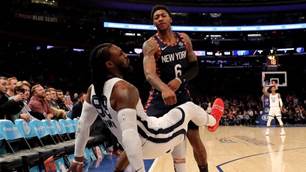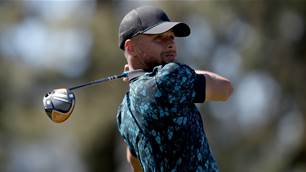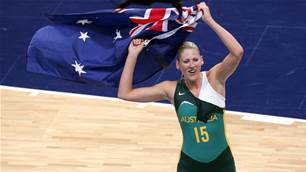It's beginning to look a lot like the NBA regular season is effectively over. Rather than sit around and wait for basketball to come back into our lives, let's reflect on what the season has dished up to this point. We'll take a look at each and every NBA team over the coming weeks, assessing what went right, what didn't go to plan, and where their journey took them as well as where the team hoped it would take them.
Today, we investigate three teams that, for different reasons, help make the argument for those that want to abolish conference seedings for the playoffs and move to a league wide 1-16 format: the New Orleans Hornets, Orlando Magic and Portland Trailblazers.
Orlando Magic
Record: 30-35 (8th in the Eastern Conference)
82 game pace: 38-44
Expectations
The season expectations in Orlando were the same as they are every season: scrape into the playoffs and hope to avoid getting waxed by their elite opponent. Oh sure, there was talk of the development of the youngsters like Jon Isaac, Markelle Fultz and Mo Bamba; finding the right mix of talent to bring the best out of Aaron Gordon (really, not a hard equation: PLAY THE MAN AT THE FOUR!!!); and to see continued production out of vets Nik Vucuvic and Evan Fournier. But ultimately all that matters in Orlando is hosting a pair of playoff games every season.
What went right
Well, they achieved their objective, so I guess you could say that on the whole the season went pretty well. And on a macro level, you would be correct.
On a micro level there we're success stories as well, this season. First and foremost is the rebirth (is it really a rebirth when you were never really 'born' in an NBA sense?) of Fultz. The former 76er put up solid averages of 12.1 points, 5.2 assists and 1.3 steals. His outside shooting is still woeful (25.4%) although his 72.3% free throw shooting is encouraging. Overall, Fultz didn't set the world on fire, but in flashes he demonstrated most of the elements that got him drafted at #1 in 2017: excellent passing, pesky defense, outstanding athleticism and crafty finishing at the rim.
Before injury struck, causing him to miss the last 31 games of the season, Isaac was a defensive menace with 2.4 blocks and 1.6 steals per game. I'm sure Coach Steve Clifford would like to see his 6.9 rebounds improve next season, but a +2.9 defensive box +/- indicates the man was a beast at that end of the court.
Fournier averaged a career best 18.8 points per game. It will be interesting to see if he opts in to his $17 million player option for next season.
What went wrong
Injuries didn't help Orlando's cause this season. Vucevic and Fournier both missed time. The bench units cratered when underrated backup DJ Augustin sat for a month. Isaac's injury disrupted a breakout season, but it was a blessing in one sense: Aaron Gordon was able to move to his natural power forward spot. At the four, AG went on a tear including 18.6 points, 8.9 rebounds, 5.7 assists and 39.6% shooting from behind the arc in February. Isaac's health was a curse in another sense in that it leads to this question: can Isaac play the centre position? If he's too slight to take the nightly pounding, then Orlando probably needs to move on from one of him or Gordon. Neither idea is palatable.
The outcome
The Magic got what they wanted. For the most part, the youngsters developed (tick) and they will – assuming we have them – be in the playoffs (tick). Great season (tickety tick tick!). Well, yeah. It is, assuming mediocrity is your aim.
What Orlando needs more than anything is the courage from ownership and the front office to embrace a proper rebuild. The Magic have a nice young core, and some solid vets. Personally, I think trading Vooch and seeing if Isaac and/or Bamba are your centres of the future seems a no brainer. It's understandable if the team decide to keep Fournier long term, but he'll be hot property assuming he opts in to his contract. A trade seems prudent.
New Orleans Pelicans
Record: 28-36 (10th in the Western Conference)
82 game pace: 36-46
Expectations
There was little to no consensus coming into the season as to what the Pelicans should be aiming for. With the Lakers young former core in Lonzo Ball, Brandon Ingram and Josh Hart coming over in the Anthony Davis trade, and the addition of heralded rookie Zion Williamson, the team was suddenly young and talented. Did that indicate a steady approach, letting the youngsters play through their mistakes to gain long term growth? Or did the additions of Derrick Favors and JJ Redick, alongside incumbent star Jrue Holiday mean that the team was going to make a playoff push?
In short, nobody really knew what this team was, but everyone was excited for the journey.
What went right
He may hove only graced us with his presence for a short time, but Williamson was everything we'd hoped for. From his 4th quarter explosion in his debut game, to the gravity defying blocks, to bullying the reigning MVP, Zion was electric. His partnership with Ball is mouthwatering: the preternatural passing savant and the impossibly athletic finisher.
When healthy, the less heralded signings of Favors and Redick were invaluable. Redick only did exactly what he has done for well over a decade: provide perfect spacing by knocking down jump shots. In 26 minutes per game he knocked down 2.9 three pointers at a white hot 45.2%. Favors provided stout interior defense for a team that desperately needed it. He missed over 20 games due to injury and a the loss of his mother, but when he played, his positional defense and excellent rebounding (amazing how many boards you can get when Rudy Gobert isn't around!) gave the team a base to build from.
The biggest winner this season for the Pellies might have been Brandon Ingram, who finally blossomed. Being out of the glare emanating from LeBron James (and Lakers in general) spotlight seemed to take a weight from Ingram's slender shoulders as he put up his first All Star campaign. With averages of 24.3 points, 6.3 rebounds, 4.3 assists and a steal a game (needless to say, all career highs) he was undoubtedly the go to player for New Orleans this season. The greatest and most important improvement in his game was his deep shooting. Ingram had never averaged more than a single trey per game in Los Angeles, yet dropped 2.4 of them here at an excellent 38.7% clip.
What went wrong
Injuries. That's it. If it wasn't for injuries, this team would undoubtedly be in the playoffs.
Williamson famously hurt his knee in his final preseason hit out and missed 45 games as a result. Favors of course missed significant time and that left the team with the softest centre this side of Frank Kaminsky. But Holiday, Ingram, Ball and Redick, as well as important 2nd unit swingman E'Twuan Moore all missed at least 9 games each.
After being so shallow thought the Davis era, this team was suddenly very deep. They could mix and match at the guard and wing positions, but really didn't have anybody that could replicate what Favors and Williamson gave them. That ultimately cost them.
The outcome
Depending on where you stood at the beginning of the season, you're either doing backflips, or doing backflips with a tinge of disappointment about not making the playoffs. Either way, you're pretty excited about where this team could be in the next few years.
The young core of Williamson, Ingram, Ball, Hart, Frank Jackson, Nickeil Alexander-Walker and Jaxson Hayes is impressive. That's not to say there aren't holes to fill. Hayes will need to develop to give Favors broken body more of a rest. Redick will be 36 before the end of this season; he can't keep racing around screens forever. The building blocks are there, however. This is a team with perhaps the brightest future in the NBA.
Portland Trailblazers
Record: 29-37 (9th in the Western Conference)
82 game pace: 36-46
Expectations
Portland's playoff run last season - a run to the Western finals ended by the Warriors – combined with the injury and defection induced decline of the Dubs, led many to believe that the Blazers were an outside chance to make the NBA Finals, despite the two Los Angeles sides loading up. After all, the Blazers had stability and culture on their side, not to mention no little amount of talent.
The front court was thin, especially with Jusuf Nurkic slated to miss most of the season. But their recent imports, who all under performed in previous stops, would hopefully buy into the Damian Lillard led Spurs-lite culture, and that would be enough for Portland to nab – at worst – the 3rd seed.
What went right
Relative to expectation, not a whole lot went right for Portland. The thin front court was exposed through injuries to Zach Collins, who played only three games before hurting his shoulder and Rodney Hood, who averaged 11 points and shot a scorching 49.3% from deep before tearing his achillies in December. Things got so bad that the team exhumed Carmelo Anthony from enforced retirement. To be fair, Melo outperformed most expectations with 15.3 points and 6.3 boards per night, though he remains a defensive liability.
Hassan Whiteside was tremendous stepping into Nurkic's shoes. The former Miami redemption project gave his team 16.3 points, 14.2 rebounds (2nd in the NBA) and 3.1 blocks (league leading by a wide margin) per night. He is close with Lillard off the floor and that clearly helped the chronic malcontent finally find peace on the court. With Nurkic returning, Portland are in the enviable position of having two very good centre's on roster – one will surely get traded elsewhere for a nice piece.
The only thing that could slow Lillard this season was injuries. He missed 6 games through February and March, but was electric when on the floor: 28.9 points (5th in the league), 7.8 assists (6th in the NBA) and 3.9 three pointers at 39.4%. Hi January number were outrageous: 34.1 points, 8.4 assists 4.9 makes from beyond the arc. Lillard did everything he could to drag his injury depleted squad to the playoffs in another top MVP worthy campaign.
What went wrong
The Blazers front court was absolutely snake bit. Losing Nurkic to a broken leg in last season's playoffs was only the tip of the iceberg, as it turned out. Losing Hood and Collins meant that the team lost it's entire starting front court from last season's playoffs. Whilst Whiteside was immense, and Melo surprisingly competent, Coach Terry Stotts simply couldn't find anybody to capably fill Hood's small forward spot. Kent Bazemore worked hard as always, but was over matched. The team had to trade for the 34 year old Trevor Ariza – himself underwhelming in Sacramento – to fill the void. Ariza was serviceable once he joined the team.
The other notable off season addition was former #5 overall pick Mario Hezonja. The headstrong forward has never really played in a culture as strong as Portland's and it was hoped that this would bring out the best in the enigmatic Croatian. It didn't go so well. Hezonja was awful at both ends of the court. Perhaps the NBA is coming to the realisation that he just isn't that good.
The outcome
A disastrous season in Portland sees them missing the playoffs for the first time since 2013: Lillard's rookie year.
Due to the state of flux the front court found itself in, it's tough to make any judgements on where the Blazers go to from here. With Lillard, CJ McCollum, Hood, and Nurkic all between 25 and 29 years old, and Collins still a mere pup at 22, it's expected that Portland roll it over and take this core into next season. The key's for Portland from here will be whatever they can get for the centre (likely Whiteside) that they move on and, obviously, health. Should the Blazers stay relatively injury free, a vengeance season from Lillard will be exciting to watch.
Related Articles

Winners & Losers of the NBA restart

NBA star launches Tour for underrepresented kids


.png&h=115&w=225&c=1&s=1)










